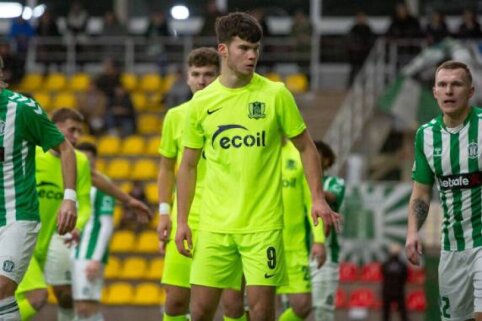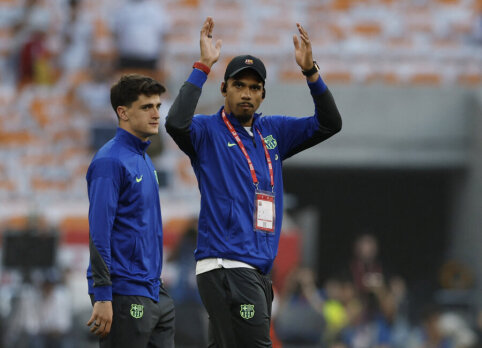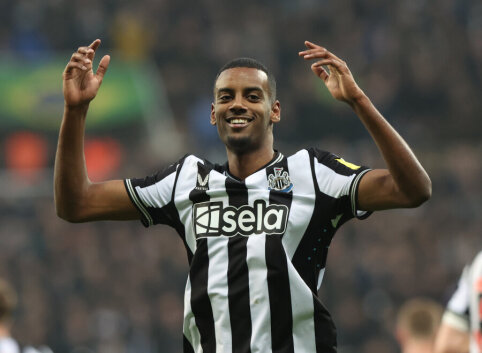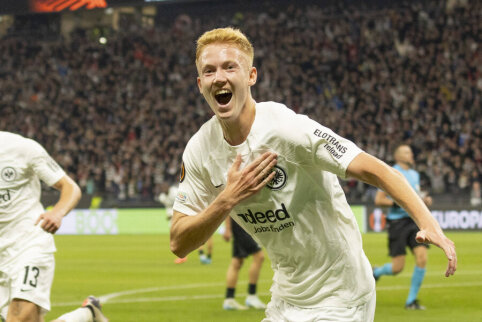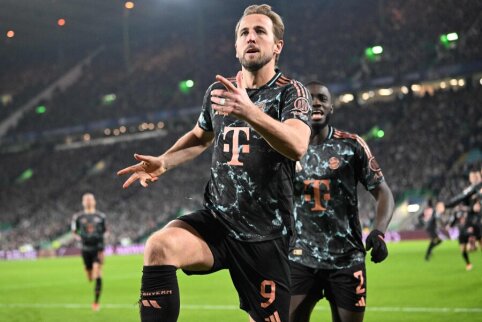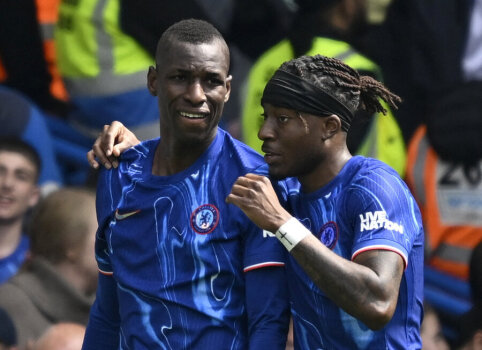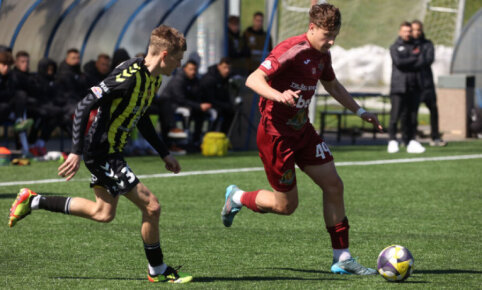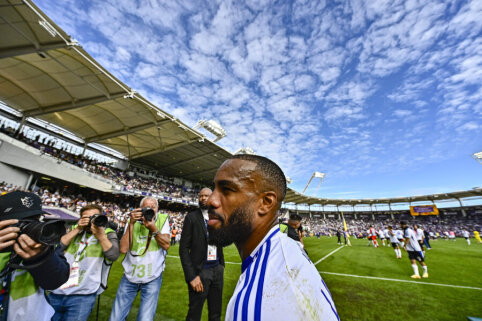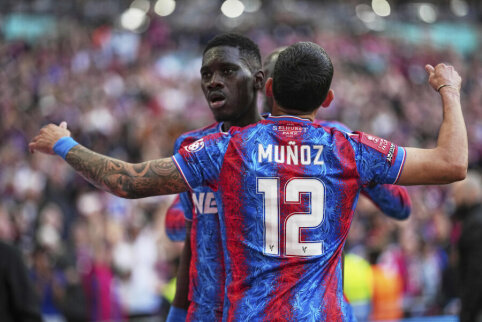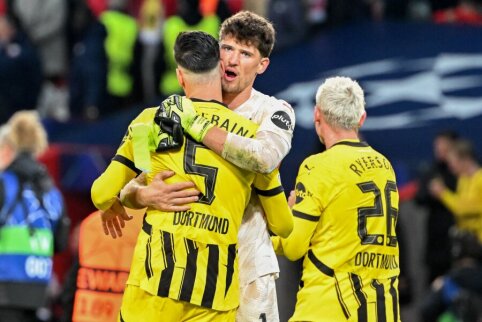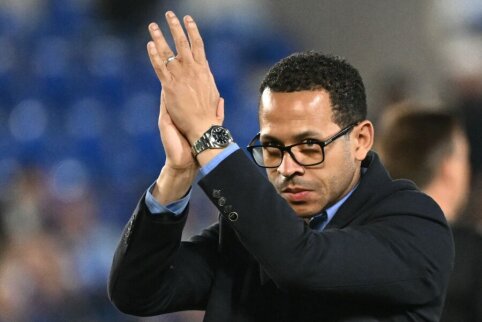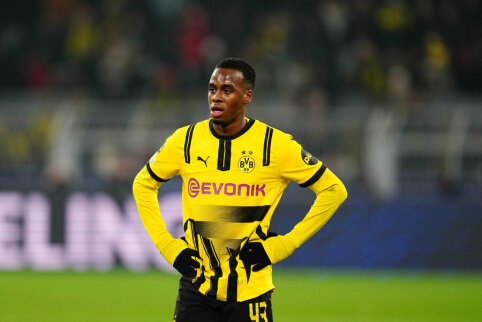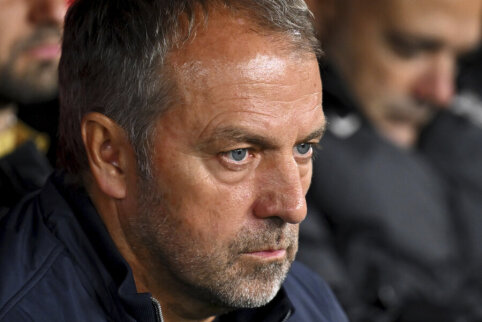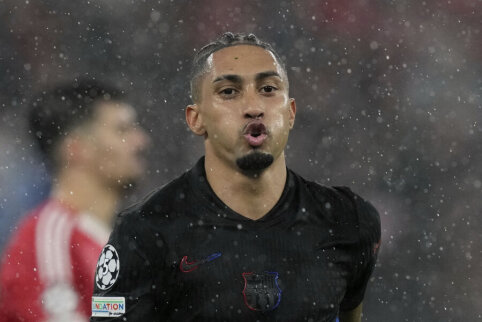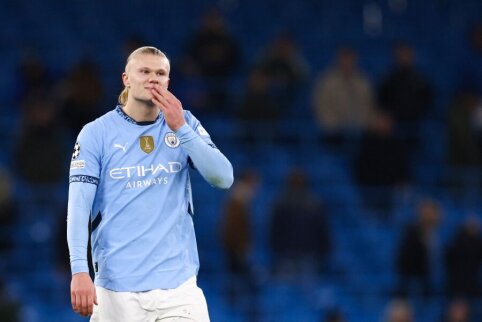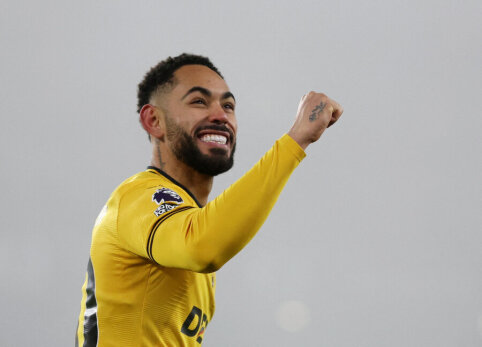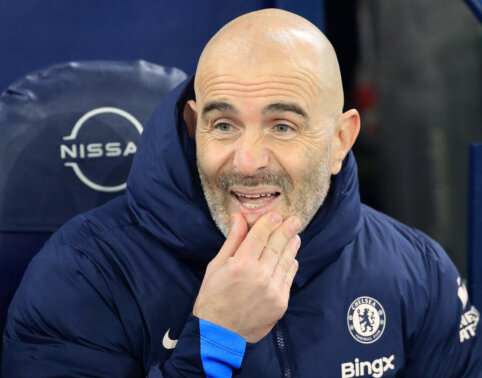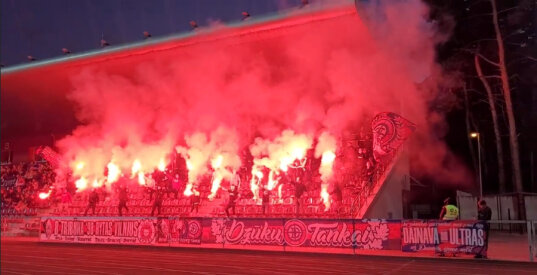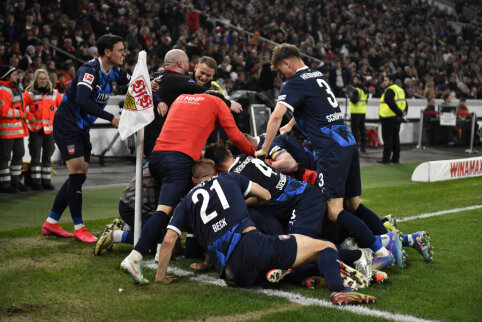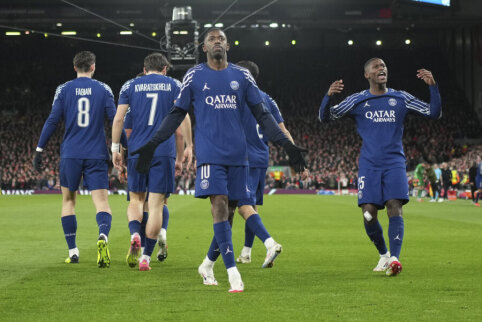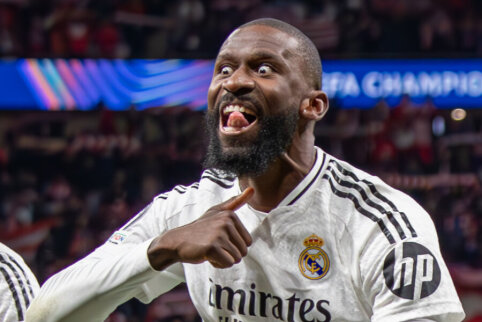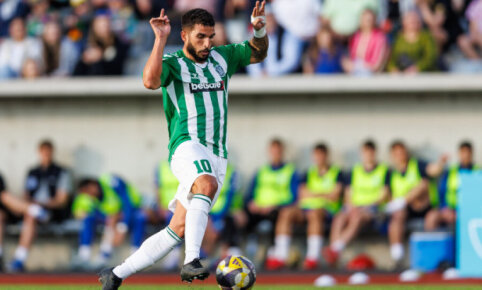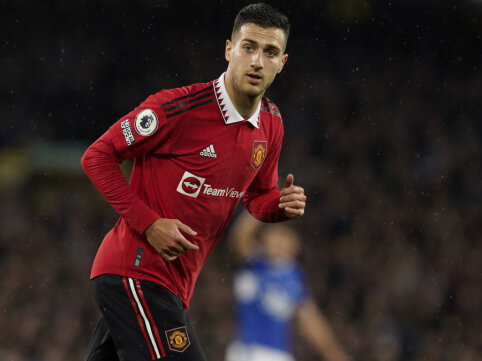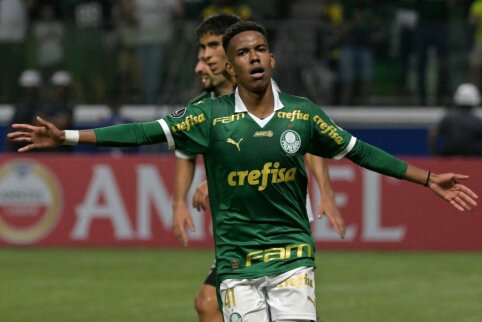 © EuroFootball.com
© EuroFootball.com
FK "Sūduva" head coach Virginijus Liubšys is one of the most experienced football coaches in Lithuania. His face and name have been known and seen by every Lithuanian football enthusiast for many years. On the occasion of the approaching coach's birthday (on May 12th he will celebrate his fifty-fourth birthday), fksuduva.lt decided to introduce "Sūduva" fans to Virginijus Liubšys - his history of entering football, family, and hobbies.
- How did your journey into football begin? How did you discover this game? - It turned out that the yard I grew up in Panevėžys was very "sporty", everyone played football. I was one of the smallest among friends, so I always had to play in the goalkeeper position. The stronger kids ran around the field, while I was asked to stand in the gate and wait (smiles). I would say that my interest in football started from those childhood games, the desire to play. When I was in fourth grade, a couple of years older friend from the yard took me to my first training session with then-coach Balilionis. That's when I started to seriously engage in sports. Football always involves a huge selection, and at that time almost all boys wanted to play. There were about 5-6 goalkeepers in the team, and I was the smallest among them, so I had to "guard" the goal very rarely. However, football is a game that requires a lot of patience and perseverance. To achieve a goal, you have to endure a lot and wait for your opportunity when coaches start to trust you more and allow you to play more and more. Over the years, the ranks of goalkeepers started to thin out, until finally there were only two of us left. From then on, I started playing in the starting lineup. I remember my first serious matches, it was at the indoor football winter championships, where I successfully "defended" the goal throughout the entire game. I think that's when my career began - I rarely had to sit on the bench, the coach allowed me to play. Later came the debut in the very strong Lithuanian top league. I was 17 years old at the time, considerably taller and stronger, and played for the Panevėžys "Statyba" team. My desire to be a goalkeeper, which appeared in the yard, turned into a lifelong career.
- Who was your biggest role model when you took your first steps in your career? - It was Vaclovas Jurkus. He was the epitome of hard work, a person who could train for 6-8 hours without stopping. He would come to extra training sessions and work hard, which is why he was the best goalkeeper of those times. It is important to note that at that time there were no specialized goalkeeper coaches, there was only one coach who taught everyone equally. I gained a lot of lessons and experience in Panevėžys, with my first coach Balilionis. The main "engine" was my desire, enthusiasm, and feeling that this interest in football would be the foundation of my entire life.
- Tell us how you started your career as a coach? - I graduated from the Kaunas Sports Institute at the time and immediately received offers from various cities in Lithuania, but my heart was set on Panevėžys. When I returned to my hometown, I started working as a coach, assembling a team of children born in 1972. They were my first pupils. Among them were Deimantas Bička (former Panevėžys "Ekranas" player) and Arvydas Skrupskis (current "Ekranas" coach). With this team, we won the Lithuanian championship several times. At that time, I also played for "Ekranas" and had a children's team, from which my coaching career began. Events took a different turn in 1989 when the coach of Panevėžys "Ekranas" unexpectedly left his position. Thanks to the then "Ekranas" director Valdemaras Šteinys, and with the approval of the director of the "Ekranas" factory, it was decided that I was the most suitable candidate to take over as head coach. In the beginning, there were many difficulties, as I was still a player on the team. When I took over as the coach, I was only 31 years old. I think I was probably the youngest coach in Lithuania. When I first stood in the coach's position, it felt strange, as I had to give instructions to people I had been playing with for so many years. Some were even older than me. During the first training session, I realized that I, as a coach, didn't know anything at all. Luckily, it was the winter season, and preparations were underway. During this time, I went to the academy many times, consulted with football specialists. It's one thing to come to a training session and mark something down or make a note, but it's quite different when you have 25-30 people in front of you to whom you need to give instructions, train well, and prepare. I think that was the most challenging period when I had to find a balance within myself - between being a player and being a coach at the same time. However, I quickly realized that it was impossible to juggle both roles. Therefore, in 1991, after a fairly unsuccessful competition, I hung up my goalkeeper gloves for good.
- What teams have you had the opportunity to coach during your career? - It's my second season coaching at Marijampolė's "Sūduva". I coached Šiauliai's team for a year, worked with Vilnius' "Vėtra" for two years, but I dedicated the most years - 26 years - to Panevėžys' "Ekranas". The most pleasant and best memories are associated with this team. After Lithuania regained independence, the first cycle of creating Olympic teams began, and I was involved in this process from the beginning, in 1992. I had the opportunity to work with many well-known, prominent coaches, one of them being Benjaminas Zelkevičius. Working as an assistant coach, I gained a lot of experience, accumulated knowledge. However, there came a time when a decision had to be made, as I mentioned earlier - it's impossible to juggle two jobs. When I had to leave with the national team, my club suffered, so in 2004, I made the final decision and devoted all my time and energy to "Ekranas".
- What is the most challenging part of being a coach? - Perhaps the most challenging part is that it is not always easy to convey to the team what you want. Sometimes everything seems perfect: a good team, excellent players, but something still seems to be missing. Then it becomes difficult, and you start to think that maybe something is wrong, maybe you are not conveying everything correctly. It is also very difficult to maintain a balance within the team.
- What do you mean by balance? - The team must be like a family - united, strong, and attentive. If something bad happens to one, others must go through it with them, if one experiences success, others should celebrate. If the team is like a family - the goal, in this case, victory, is eventually achieved. A very good example of this is Vilnius' "Vėtra", which worked under very difficult conditions but managed to achieve excellent results. The "family" spirit is also present in the "Ekranas" team. This balance gives a significant boost to the coach, even if everything seems to be going wrong, but if the team is united, it compels itself to achieve the highest goals and prove its worth. This is both the most challenging and the most enjoyable thing.
- What else brings you joy as a coach? - What brings me the most joy and happiness is seeing the progress of a young player - seeing how they improve, grow, and how their career advances. It's rewarding when a player from your team becomes more and more valuable, when others start to notice them - national or Olympic team coaches. It acts as a psychological impulse. Seeing the player's rise, you feel that you contributed to it.
- In your opinion, what qualities are needed to become a good coach? - The main quality needed to become a good coach is belief in what you do. When you believe in yourself, your decisions, and you do not hesitate, sooner or later you achieve your set goals, you achieve the desired results. Of course, sometimes you have to wait a long time for it, which requires a lot of patience. The most important thing is not to get distracted, to have your own path, make decisions, believe in them, and not give in to moments of weakness. You have to be stubborn and, as I mentioned, always believe in yourself and the team. Being indecisive never helps when you have specific goals, you must go all the way to achieve them.
- What qualities do you try to instill in the team you are coaching? - I think one of the most important things a team needs is a winner's mentality. The team must cultivate it, must believe in their own strengths, and fight for victory. This quality is very difficult to develop. Teams or players who have this quality always achieve more - win titles, go to play abroad, are invited to national teams. Perhaps I will repeat myself, but belief in one's own strengths and a championship character are the most important qualities leading to sports and life victories.
- Football is the biggest part of your life, but what hobbies or activities do you have besides coaching and football? - Football has gradually taken over my entire life, so now there are only two things left - a computer and books. Especially when working far from home, I read many books. When there is a need to take a break from football, the best rest is reading. I really enjoy tense books with a good plot. Sometimes I get so engrossed in reading that I don't even notice how many hours have passed, and then I look at the clock - it's 4 in the morning (smiles).
- So, what would your life formula look like if you had to write one? - Life = football. I don't even know how I would live if football wasn't there, what I would do... Sooner or later, I will have to think about where to take my life next. When I see that I have nothing more to give in football, then I will take a different path. But for now, football is my path.
- It's your birthday tomorrow. Is this celebration special to you? How do you usually celebrate your birthdays? Do you have any traditions? - For many years, I used to celebrate my birthday at home in Panevėžys, with my family, close friends, and the team also always wished me well. However, over the years, the desire to celebrate my birthday has faded, I just want to celebrate calmly. I even forgot that my birthday was approaching... I don't make a big deal out of it, it's just another birthday, and each year it becomes less important. I'm not getting any younger, so I don't feel like celebrating in any special way. I calmly accept this day. I think the best gift would be a victory for "Sūduva" against "Šiauliai" (the match will take place on May 13th in Šiauliai - fksuduva.lt). It would be a gift not only for me but also for the team, which is currently well prepared and "thirsty" for victories, it would be a good dose of "psychological adrenaline".
